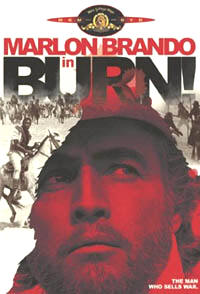QUEIMADA, originally QUEMADA(aka BURN), changed its Spanish name to the Portuguese one, because general Franco was threatening UNITED ARTISTS with a new ban of all their films in Spain, like it happened with COLUMBIA after Fred Zinnemann's BEHOLD A PALE HORSE.
| "..The film portrays, quite brilliantly, the nature of a guerrilla uprising. Walker seems all too aware of the danger of a popular uprising, when he cautions the white rulers that "the guerrilla has nothing to lose." And that in killing a hero of the people, the hero "becomes a martyr, and the martyr becomes a myth." " Amazon Review �An amazing film. . . No one, with the possible exception of Eisenstein, has ever before attempted a political interpretation of history on this epic scale.� � Pauline Kael |
| 'Queimada': Revolution In Perpetual Motion - as long as there are empires, there will be wars - "Pontecorvo was an expert on the subject of revolution, possibly even the poet laureate of violent change. An Italian communist, he wore his biases plainly on his sleeve and didn't let them prevent him from reaching greatness, as he did in 1965 in "The Battle of Algiers," a movie so pungent in its realities that the Pentagon showed it to Special Forces people just last year... the movie Queimada is most powerful as argument: It believes in the permanence of revolution, and it closes on a shot of the surly, bitter, seething people of Queimada, and in their anger it sees a forever of violence. This is the way it will go, he seems to be saying, and it doesn't seem that he got that one wrong, unless peace broke out in the past five minutes. It's brilliantly constructed to argue what might be called the classic imperial paradox: To win this war you must make inevitable the next. The corollary is that as long as there are empires, there will be wars. " |
| Queimada (1969) |
| Queimada - Trivia The film's original title was Quemada (the Spanish word for "burnt", as the action took place in a Spanish colony. When the Spanish government officially complained and threatened a boycott of the film (objecting to the script's supposedly anti-Spanish bias, Gillo Pontecorvo agreed to alter the setting to a Portuguese island and the release title became Queimada ("burnt" in Portuguese). Sir William Walker, a real historical figure portrayed in the film by Marlon Brando, was neither British nor knighted. Walker was an American adventurer and his title of "sir" was one he adopted on his own. 'Evaristo Marquez' , who plays rebel leader Jose Dolores in the film, was not an actor. He was a poor villager whom director Pontecorvo discovered while scouting locations and convinced to star opposite Brando. The studio had originally wanted Sydney Poitier. Marlon Brando once said this film contains "the best acting I've ever done" |
| Queimada - Amy Taubin |
| " Burn! was a courageous film for Pontecorvo to make. There are few films as passionate or as uncompromising about the real workings and nature of imperialism as a world order, nor a film which identifies so feelingly with the victims of neo-colonial rule. Not since Eisenstein has a film so explicitly and with such artistry sounded a paen to the glory and moral necessity of revolution. Even had United Artists not attempted to sabotage Burn!, it would be a film deserving wider viewing and critical attention. " Joan Mellen SEE THE FULL REVIEW Quemada - Gillo Pontecorvo's Burn! (tamilnation.org) |

No comments:
Post a Comment